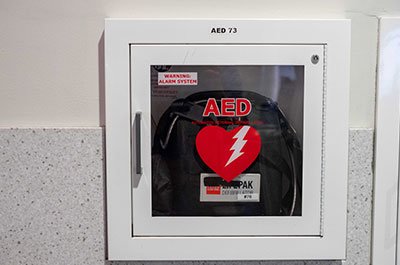Hypertrophic cardiomyopathy is a condition that causes an unexplained thickened left ventricle of the heart. While it the most common inherited heart disease – affecting up to 1 in 500 people – it is often underdiagnosed.
“Patients with hypertrophic cardiomyopathy have a wide range of symptoms that overlap with other common health conditions such as heart disease, asthma and anxiety – requiring a high index of suspicion and education of providers to reach a diagnosis,” says Bashar Hannawi, M.D., a cardiologist at Henry Ford Health. “But even a slightly abnormal electrocardiogram can identify abnormalities of the heart muscle that are reason for concern. Raising awareness around this condition is important to help with early diagnosis and successful condition management.”
Here’s what you need to know about hypertrophic cardiomyopathy.
Q: Who is at risk for hypertrophic cardiomyopathy?
Dr. Hannawi: We don’t have it all figured out yet, but we do know that hypertrophic cardiomyopathy is often inherited, however not all cases require a family history. In about 30-40% of cases, the condition is created by a unique genetic abnormality. In most of these cases, each offspring of an affected individual has a 1 in 2 chance of inheriting the genetic mutation and therefore, at risk for developing hypertrophic cardiomyopathy in the future. For this reason, we recommend genetic testing for anyone with hypertrophic cardiomyopathy – screening family members can help with early diagnosis so we can start treatment as soon as possible.
Q: How do you know if you have hypertrophic cardiomyopathy?
Dr. Hannawi: There is no standard screening for hypertrophic cardiomyopathy in asymptomatic individuals. Unless you have a family genetic connection for this condition, it is unlikely you will know you have it until symptoms arise.
Q: What are symptoms of hypertrophic cardiomyopathy you should look out for?
Dr. Hannawi: Some of the most common symptoms of hypertrophic cardiomyopathy include:
- Shortness of breath
- Fatigue
- Chest pain
- Dizziness or loss of consciousness
- Heart palpitations
These symptoms are often commonly associated with other heart conditions, so the best way for doctors to understand if someone has hypertrophic cardiomyopathy is through understanding your personal and family history, a physical exam and cardiac imaging.
Q: What are cardiologists looking for with cardiac imaging?
Dr. Hannawi: Imaging helps us identify any thickening of the cardiac muscle (also called hypertrophy). If imaging shows a thickness of 1.5 cm or greater and there is no other explanation for this, we will diagnose hypertrophic cardiomyopathy. In familial cases and patients who have a genetic mutation, a lower degree of hypertrophy is used to reach this diagnosis.
Q: How does hypertrophic cardiomyopathy relate to sudden cardiac death?
Dr. Hannawi: Sudden cardiac death can occur when the heart gives out or “dies” - often caused by an abnormal heart rhythm. If your heart is able to be restarted (with the help of CRP, an AED or defibrillator device), there is a chance for recovery.
Undiagnosed hypertrophic cardiomyopathy is the leading cardiovascular cause of sudden cardiac death in young athletes in the United States. In some instances, sudden death is the first presentation of hypertrophic cardiomyopathy in individuals. Athletes participating in high school and college sports should undergo thorough health screenings (that assess cardiovascular health) before participating in sports.
Q: If you have hypertrophic cardiomyopathy, what’s the prognosis?

Heart Specialists At Henry Ford
Dr. Hannawi: Fortunately, hypertrophic cardiomyopathy is treatable. Patients living with this condition are expected to have a normal life expectancy as long as they are able to manage their risk for sudden cardiac death. We work with patients to calculate this risk and prescribe medications and procedures to help them manage.
There are many different medication options and clinical trials available. Your cardiologist will work with you to prescribe the best medication option for your condition.
Additionally, the type of hypertrophic cardiomyopathy you have will dictate how your condition is managed. There are two different types of hypertrophic cardiomyopathy: obstructive and non-obstructive.
- Obstructive hypertrophic cardiomyopathy means you heart muscles has thickness in an area that has led to blocking (or obstructing) blood flow to outside the heart. This can be managed through invasive (surgery) or non-invasive (medications) options.
- Non-obstructive hypertrophic cardiomyopathy means blood flow is not blocked. While patients with non-obstructive hypertrophic cardiomyopathy may have less severe symptoms and be less likely to see their condition worsen over time, they have less options available if their symptoms worsen.
In less than 5% of hypertrophic cardiomyopathy cases, symptoms may progress to where they cannot be managed with first-line therapies – requiring a heart transplant to improve quality of life.
Reviewd by Dr. Bashar Hannawi, an advanced heart failure and transplant cardiologist who sees patients at Henry Ford Hospital in Detroit and Henry Ford Medical Centers in Fairlane and Bloomfield Township.



